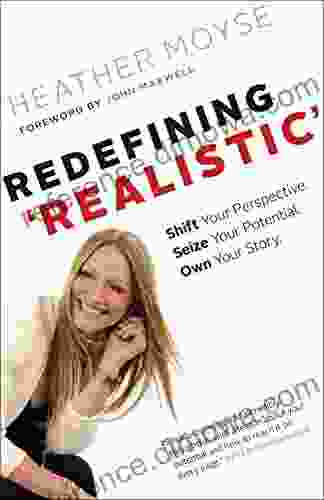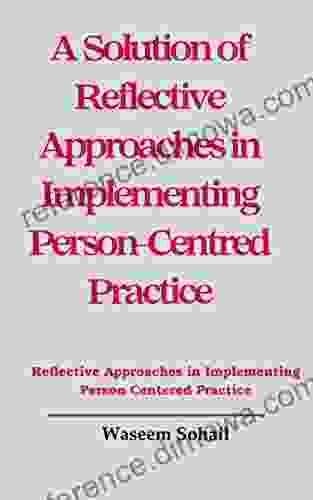Solution of Reflective Approaches in Implementing Person Centred Practice

Person-centred practice (PCP) is an empowering approach that values the individual's lived experiences and perspectives. It emphasizes the importance of creating a safe and supportive environment where individuals can explore their thoughts, feelings, and aspirations. By adopting a person-centred lens, practitioners can foster meaningful connections and facilitate positive outcomes for those they support.
5 out of 5
| Language | : | English |
| File size | : | 883 KB |
| Text-to-Speech | : | Enabled |
| Screen Reader | : | Supported |
| Enhanced typesetting | : | Enabled |
| Print length | : | 27 pages |
| Lending | : | Enabled |
Reflective practice is an essential element of PCP, as it enables practitioners to critically examine their interactions and interventions. By reflecting on their experiences, they can identify areas for growth and development, enhance their understanding of the people they support, and refine their practice to better meet individual needs.
This comprehensive guide will explore various reflective approaches to implementing PCP. We will delve into the principles and benefits of reflective practice, provide practical strategies for integrating reflective activities into your work, and discuss how to create a culture of reflection within your organization.
Chapter 1: The Principles of Reflective Practice
Reflective practice is a deliberate and structured process of examining one's thoughts, actions, and experiences to gain insights and improve future practice. It involves critically analyzing past experiences and using those insights to inform present and future actions.
The core principles of reflective practice include:
* Intentionality: Engaging in reflection with a specific purpose in mind. * Curiosity: Approaching reflection with an open and inquiring attitude. * Honesty: Reflecting openly and honestly about one's thoughts, feelings, and actions, including areas for improvement. * Collaboration: Seeking feedback and perspectives from others to enhance understanding and broaden perspectives. * Action-orientation: Using insights gained from reflection to inform and improve future practice.
Chapter 2: Benefits of Reflective Practice in PCP
Integrating reflective practices into PCP offers numerous benefits, including:
* Enhanced Self-Awareness: Reflection enables practitioners to gain a deeper understanding of their own values, biases, and beliefs, which can influence their interactions with others. * Improved Decision-Making: By critically examining past experiences, practitioners can make more informed decisions in future situations. * Increased Empathy: Reflective practice fosters empathy by encouraging practitioners to consider the perspectives and experiences of those they support. * Greater Accountability: Reflecting on one's practice allows practitioners to take ownership of their actions and be accountable for their outcomes. * Enhanced Service Delivery: By identifying areas for improvement, practitioners can enhance their skills and knowledge, leading to improved service delivery.
Chapter 3: Practical Strategies for Reflective Practice
Incorporating reflective practices into PCP can be done in various ways. Here are some practical strategies:
* Journaling: Regularly writing down thoughts, feelings, and experiences helps practitioners identify patterns, reflect on their practice, and develop insights. * Supervision: Engaging in regular supervision sessions with a qualified supervisor provides a structured opportunity to discuss and analyze practice, gain feedback, and enhance professional development. * Peer Review: Collaborating with colleagues to review and discuss each other's work fosters a culture of reflection, learning, and continuous improvement. * Case Studies: Analyzing case studies involving real-life scenarios can provide valuable insights into effective and ineffective interventions, ethical considerations, and potential challenges. * Action Research: Conducting small-scale research projects on specific aspects of practice enables practitioners to systematically gather data, analyze findings, and implement evidence-based improvements.
Chapter 4: Creating a Culture of Reflection in Organizations
Fostering a culture of reflection within an organization requires commitment and support from leadership and all levels. Here are some key strategies:
* Leadership Buy-In: Leaders must demonstrate their commitment to reflective practice by engaging in it themselves and encouraging others to do so. * Structured Time for Reflection: Allocating specific time for reflection during work hours allows practitioners to prioritize and make time for this essential practice. * Training and Development: Providing training and development opportunities on reflective approaches enables practitioners to develop the necessary skills and knowledge. * Supportive Environment: Creating a safe and supportive work environment where practitioners feel comfortable sharing their thoughts, ideas, and experiences is crucial. * Peer Support: Encouraging peer support networks and communities of practice fosters a culture of learning, collaboration, and mutual support.
Adopting reflective approaches in PCP empowers practitioners to critically examine their practice, enhance their skills, and improve service delivery. By embracing the principles and benefits of reflective practice, practitioners can create meaningful connections with individuals, support their growth and well-being, and contribute to transformative outcomes.
This comprehensive guide has provided a roadmap for implementing reflective approaches in PCP, from understanding the principles and benefits to practical strategies and creating a culture of reflection. By integrating these practices into your work, you will embark on a journey of continuous improvement, empowering yourself and those you support to live more fulfilling lives.
5 out of 5
| Language | : | English |
| File size | : | 883 KB |
| Text-to-Speech | : | Enabled |
| Screen Reader | : | Supported |
| Enhanced typesetting | : | Enabled |
| Print length | : | 27 pages |
| Lending | : | Enabled |
Do you want to contribute by writing guest posts on this blog?
Please contact us and send us a resume of previous articles that you have written.
 Book
Book Novel
Novel Page
Page Chapter
Chapter Text
Text Story
Story Genre
Genre Reader
Reader Library
Library Paperback
Paperback E-book
E-book Magazine
Magazine Newspaper
Newspaper Paragraph
Paragraph Sentence
Sentence Bookmark
Bookmark Shelf
Shelf Glossary
Glossary Bibliography
Bibliography Foreword
Foreword Preface
Preface Synopsis
Synopsis Annotation
Annotation Footnote
Footnote Manuscript
Manuscript Scroll
Scroll Codex
Codex Tome
Tome Bestseller
Bestseller Classics
Classics Library card
Library card Narrative
Narrative Biography
Biography Autobiography
Autobiography Memoir
Memoir Reference
Reference Encyclopedia
Encyclopedia Joan L Coffey
Joan L Coffey Abdullah Alriyami
Abdullah Alriyami Anna Bianchi
Anna Bianchi George V Roberts
George V Roberts Aaron Patterson
Aaron Patterson Kyle Umlang
Kyle Umlang A V Laudon
A V Laudon Mary Depner
Mary Depner A M Strickland
A M Strickland Kelly Greenawalt
Kelly Greenawalt Adam Hargreaves
Adam Hargreaves Harri Garrod Roberts
Harri Garrod Roberts Adam Brandenburger
Adam Brandenburger Mike Magnuson
Mike Magnuson Gwen Floyd
Gwen Floyd Derek Fridolfs
Derek Fridolfs Meghan O Gieblyn
Meghan O Gieblyn Barbara Samuels
Barbara Samuels A R Kahler
A R Kahler D C Kizhakemuri Bhashapadanakendram
D C Kizhakemuri Bhashapadanakendram
Light bulbAdvertise smarter! Our strategic ad space ensures maximum exposure. Reserve your spot today!

 Elliott CarterDiscover the Enthralling World of 'Part Four: The Heart Goes Last in Chicago'
Elliott CarterDiscover the Enthralling World of 'Part Four: The Heart Goes Last in Chicago' Vincent MitchellFollow ·18.5k
Vincent MitchellFollow ·18.5k Manuel ButlerFollow ·2k
Manuel ButlerFollow ·2k Jamison CoxFollow ·10.5k
Jamison CoxFollow ·10.5k Rod WardFollow ·11k
Rod WardFollow ·11k Lord ByronFollow ·5k
Lord ByronFollow ·5k Ben HayesFollow ·8.5k
Ben HayesFollow ·8.5k David PetersonFollow ·17k
David PetersonFollow ·17k Clinton ReedFollow ·16.7k
Clinton ReedFollow ·16.7k

 Julio Cortázar
Julio CortázarShift Your Perspective, Seize Your Potential, Own Your...
A Transformative Guide to...

 Isaias Blair
Isaias BlairPractical Algorithms For 3d Computer Graphics: Unlocking...
In the realm of digital artistry, 3D computer...

 Joseph Heller
Joseph HellerClear Vision Through Cloudy Eyes: A Guide to Overcoming...
Have you ever felt...

 Leo Tolstoy
Leo TolstoyThe True Story of My Fairygodparent Who Almost Killed Me...
Book Description In this captivating...

 Earl Williams
Earl WilliamsCanada 10 Must Visit Locations: A Captivating Journey...
Prologue: A...
5 out of 5
| Language | : | English |
| File size | : | 883 KB |
| Text-to-Speech | : | Enabled |
| Screen Reader | : | Supported |
| Enhanced typesetting | : | Enabled |
| Print length | : | 27 pages |
| Lending | : | Enabled |












